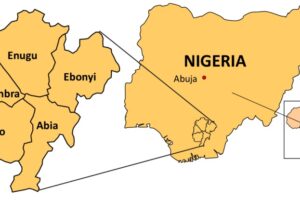
By Christian C. Madubuko Ph.D
The Nigerian Foreign Service is the cornerstone of Nigeria’s diplomatic endeavours, serving as the primary conduit for the country’s interactions with other nations, international organizations, and global forums. The Nigerian Foreign Service has its roots in the colonial era when Nigeria was a British colony. The British colonial administration established a foreign service in 1914, which was responsible for managing Nigeria’s relations with the British government and other European powers. After Nigeria gained independence in 1960, the foreign service was reorganized and restructured to reflect the country’s new status as a sovereign nation.
As a vital component of the country’s foreign policy apparatus, the Foreign Service plays a multifaceted role in advancing Nigeria’s interests, fostering cooperation, and safeguarding the country’s sovereignty. Through its various diplomatic channels, the Foreign Service navigates the complex web of international relations, often walking a delicate balance between promoting national interests, resolving disputes, and upholding Nigeria’s values and principles. In this article, I will embark on an in-depth exploration of the Nigerian Foreign Service’s rich history, its operational dynamics, and its intricate relationships with the outside world, shedding light on the critical role it plays in shaping Nigeria’s presence on the global stage. Today, the Nigerian Foreign Service is headed by the Minister of Foreign Affairs, who is responsible for overseeing the country’s diplomatic missions and consulates around the world.
Operations of the Foreign Service
The Nigerian Foreign Service is a dynamic and multifaceted institution that operates through a vast network of diplomatic missions and consulates spanning over 100 countries worldwide. The primary objectives of these missions are designed to advance Nigeria’s national interests and sovereignty, while also fostering a spirit of global cooperation and partnership. Specifically, the Foreign Service’s diplomatic missions are tasked with:
Protecting Nigeria’s national interests and sovereignty by promoting the country’s economic, political, and social development.
Facilitating trade agreements and economic cooperation with other countries, thereby enhancing Nigeria’s economic prosperity and global competitiveness.
Strengthening cultural and educational ties with other countries, thereby promoting cross-cultural understanding, knowledge sharing, and people-to-people diplomacy.
Providing critical consular services to Nigerian citizens abroad, including assistance with emergency situations, legal issues, and other matters affecting their well-being.
Advocating for Nigeria’s interests in international organizations and forums, such as the United Nations, African Union, European Union, and other regional bodies, to promote the country’s values and priorities on the global stage.
Through these diverse operations, the Nigerian Foreign Service plays a vital role in shaping Nigeria’s relationships with the outside world, promoting the country’s interests, and advancing its global reputation. The Foreign Service is also responsible for maintaining relations with international organizations such as the United Nations, African Union, European Union, and other regional bodies.
Global Engagement and Relations with the Outside World
The Nigerian Foreign Service engages in a robust and multifaceted diplomatic endeavour with countries around the world, fostering meaningful relationships that promote mutual understanding, cooperation, and prosperity. Nigeria has established strong bilateral ties with major economies such as The United States, United Kingdom, France, Australia, Singapore, China, India, and South Africa in addition to several other countries through comprehensive trade agreements, which have facilitated increased trade volumes, investment, and economic growth.
The Foreign Service also promotes cultural exchange programs, including scholarships, language training, and cultural festivals, to deepen people-to-people connections and promote cross-cultural understanding. Furthermore, Nigeria has collaborated with other countries on pressing security issues, including counterterrorism, peacekeeping, and maritime security, to enhance regional stability and global security. Additionally, the Foreign Service plays an active role in international organizations such as the United Nations, African Union, and Economic Community of West African States (ECOWAS), to advance Nigeria’s interests and promote regional integration. Through these various channels of engagement, the Nigerian Foreign Service works to build a more peaceful, prosperous, and interconnected world.
Navigating Complexity:
Despite its critical role in shaping Nigeria’s global relationships, the Foreign Service is confronted with a complex array of challenges that threaten its effectiveness. One of the most pressing concerns is the limited resources allocated to the service, which often hinders its ability to carry out its mandate with precision and impact. The inadequacy of infrastructure in many of Nigeria’s diplomatic missions is another significant challenge, as it undermines the ability of diplomats to operate efficiently and effectively.
Furthermore, corruption remains a pervasive and corrosive issue within the Foreign Service, compromising its integrity and credibility. The rise of new global powers has also introduced a new layer of complexity, requiring the Foreign Service to adapt quickly to shifting diplomatic dynamics and adjust its strategies to stay relevant. As the country navigates these challenges, it is essential that the Foreign Service is equipped with the necessary resources, infrastructure, and leadership to overcome these hurdles and continue to serve Nigeria’s interests with distinction.
Elevating Nigeria’s Diplomatic Ambition: A Framework for Excellence
To position Nigeria’s Foreign Service for excellence, a multifaceted approach is required that addresses the existing challenges and leverages innovative opportunities and strategies. These innovative strategies, enhances organizational capacity, and fosters a culture of excellence. This framework for excellence is built upon the following key pillars, which can help propel the service to new heights.
These pillars are:
Strategic Leadership: Strategic leadership is a critical component of Nigeria’s Foreign Service, as it provides the vision, direction, and guidance necessary to drive the service’s mission and objectives.
Resource Optimization: Ensure sustainable funding and allocate resources effectively to support diplomatic missions, enhance infrastructure, and provide adequate training and capacity building for diplomats.
Innovative Infrastructure: Invest in modern, efficient, and secure diplomatic infrastructure that enables seamless communication, collaboration, and service delivery.
Integrity and Accountability: Implement robust anti-corruption measures to prevent and detect corrupt practices, promoting a culture of transparency and accountability within the Foreign Service.
Strategic Partnerships: Foster strong partnerships with other countries, international organizations, and private sector entities to leverage expertise, resources, and networks, enhancing Nigeria’s global influence and cooperation.
Digital Diplomacy: Develop a robust digital diplomacy strategy that leverages technology to enhance communication, engagement, and service delivery, as well as promote Nigeria’s image and brand globally.
Diplomatic Training and Capacity Building: Provide regular training and capacity-building programs for diplomats to enhance their skills, knowledge, and adaptability in a rapidly changing global environment.
Effective Communication: Implement effective communication strategies to promote Nigeria’s interests, values, and priorities globally, while also engaging with diverse stakeholders and the Nigerian public.
Inclusive Representation: Ensure that the Foreign Service is representative of Nigeria’s diverse demographics, cultures, and perspectives, promoting a more inclusive and effective diplomacy.
Risk Management: Develop robust risk management strategies to mitigate potential threats and challenges, ensuring the safety and security of diplomats, missions, and national interests.
Review and Adaptation: Regularly review and adapt Nigeria’s Foreign Service strategy to respond to changing global dynamics, trends, and challenges, ensuring the service remains agile, effective, and relevant.
By prioritizing these areas, the Foreign Service can enhance its global influence, promote Nigeria’s interests, and strengthen its reputation as a reliable and effective partner on the international stage. A strategic leadership approach will ensure that the service is guided by a clear vision and mission, while digital diplomacy will amplify its reach and engagement with diverse audiences. Inclusive representation will guarantee that the service reflects the diversity of Nigeria’s society, and effective communication will foster stronger relationships with stakeholders.
Meanwhile, robust risk management will mitigate potential threats and challenges, and capacity building will equip diplomats with the skills and knowledge needed to navigate the complexities of global diplomacy. By implementing these strategies, Nigeria’s Foreign Service can position itself as a model of excellence in Africa and beyond, promoting peace, prosperity, and cooperation on the world stage, while enhancing its global influence, reputation, and impact.
Concluding Remarks: Strengthening Nigeria’s Global Footprint
As we conclude this exploration of the Nigerian Foreign Service, it is evident that the service is a vital pillar of Nigeria’s global relations, playing a crucial role in promoting the country’s interests, values, and priorities on the international stage. With a renewed focus on strategic leadership, digital diplomacy, inclusive representation, effective communication, risk management, and capacity building, the Nigerian Foreign Service can emerge as a model of excellence in Africa and beyond.
As Nigeria navigates the complexities of a rapidly changing global environment, it is imperative that the Foreign Service is equipped with the skills, knowledge, and resources necessary to effectively engage with diverse stakeholders, promote national interests, and foster stronger relationships with other countries. By embracing innovation, adaptability, and a commitment to excellence, the Nigerian Foreign Service can position itself as a trusted and respected partner on the world stage.
In conclusion, the Nigerian Foreign Service is a vital component of Nigeria’s global relations, and its strength and effectiveness are critical to the country’s economic development, security, and diplomatic influence. As we look to the future, it is essential that we prioritize the development of this service, ensuring that it is equipped to meet the challenges of an increasingly complex and interconnected world. Finally, as Nigeria continues to evolve on the global stage, it is essential that the Foreign Service remains agile, adaptable, and responsive to changing global dynamics. By strengthening its institutions and relationships with other countries, Nigeria can build a more prosperous and secure future for its citizens.
Key Recommendations:
Strengthen Strategic Leadership: Provide clear direction and vision for the Foreign Service, ensuring that it is aligned with Nigeria’s national interests and priorities.
Invest in Digital Diplomacy: Leverage technology to enhance communication, engagement, and service delivery, while promoting Nigeria’s image and brand globally.
Promote Inclusive Representation: Ensure that the Foreign Service reflects the diversity of Nigeria’s society, fostering a culture of inclusivity and diversity.
Develop Effective Communication Strategies: Implement robust communication strategies that promote Nigeria’s interests, values, and priorities globally.
Enhance Risk Management: Develop robust risk management strategies to mitigate potential threats and challenges, ensuring the safety and security of diplomats, missions, and national interests.
Invest in Capacity Building: Provide regular training and capacity-building programs for diplomats to enhance their skills, knowledge, and adaptability in a rapidly changing global environment.
By implementing these recommendations, Nigeria can position its Foreign Service as a pillar of excellence in Africa and beyond, promoting peace, prosperity, and cooperation on the world stage.
Dr. Christian C. Madubuko is a Senior Lecturer at the Department of History & International Studies, Nnamdi Azikiwe University, Awka, Nigeria, and also a Researcher at LaTrobe University, Melbourne, Australia. Madubuko was a former Commissioner for Diaspora Affairs, Culture & Tourism. He writes from Canberra, the Australian Capital Territory. ACT.




